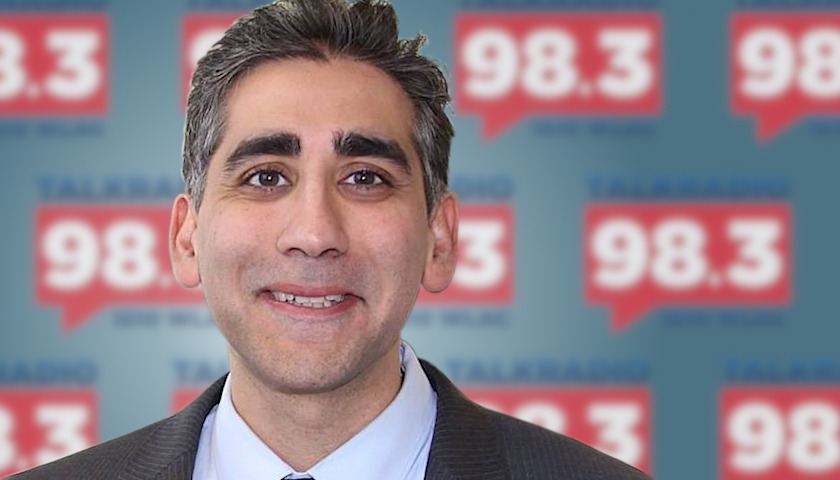Live from Music Row Monday morning on The Tennessee Star Report with Michael Patrick Leahy – broadcast on Nashville’s Talk Radio 98.3 and 1510 WLAC weekdays from 5:00 a.m. to 8:00 a.m. – Leahy was joined on the newsmakers line by Dr. Manny Sethi.
At the top of the second hour, Dr. Sethi said he believed that the main issue right now is testing and reporting on negative testing in order to help track the coronavirus. He did, however, advise listeners that we can’t let fear rule our decisions and that he believes in his heart that we will as a nation make it through this.
Leahy: We thought we’d get a real expert on things medical and we’ve asked Dr. Manny Sethi to join us this morning. Dr. Sethi as you know is running for the United States Senate. The Republican nomination. He’s running against Bill Hagerty.
Sethi: Hey brother, hey Mike. Good morning. How are you doing?
Leahy: I think everybody is a little more than concerned. And we thought since you are a medical doctor with a lot of experience that you might try and help us understand this situation. I want to talk a little bit about some of the public policy and then we’ll get into a little bit later of things that people should do.
My question to you is, are we overreacting to this situation with all these drastic draconian measures to shut everything down. It seems like it’s going to be happening but tell us your view on it.
Sethi: Here’s the thing, Mike. I’m a trauma surgeon so by nature what I do is I get thrown into situations a lot where there’s complete chaos. And in those moments which you realize early on in your career is this pressure to act. What I’ve told residents and fellows is when people move fast you’ve got to move slow.
You’ve got to be deliberate. You’ve got to be thoughtful. To your point, we just don’t know a lot of whats going on. There’s a lot of fear and anxiety. It’s like driving your truck down the road at night with your lights off. Maybe you hit a car and maybe you don’t. Just a lot of uncertainty.
And I applaud the President for what he’s doing and the way he’s doing it. Meaning look, things have to be on a case by case basis. In California, if you think you have to take drastic measures or New York or Washington if you need to take drastic measures do that. But here in Tennessee, we should be able to do what we want to do. Now, how far this goes? I don’t know.
The best thing we can do right now is personal hygiene. Wash your hands. This social distancing business. I think that’s important. Just take care of your family. I will say some of the data out there we are just not sure yet. Here in America, we are seeing younger patients actually present to the hospital getting sicker as compared to older folks in Italy and Spain. So it’s just different.
Leahy: I just read the latest data here in Tennessee which showed that 505 confirmed cases of coronavirus 162 are in people aged 21-30. So that’s a pretty high rate it would seem to me.
Sethi: That’s right. And some of those people are getting really sick. And it’s very different from anything they’ve seen in South Korea. Or France. Or Italy. And so we just got to better understand that younger folks think they are invincible and that why they’re coming down with it. Has the virus changed a little bit? Is it just presenting differently? We just don’t know.
Leahy: Early on I saw a report from Cheryl Atkinson who reported that at the time we had like 67 deaths and at that time only one was from somebody under the age of 50. All the rest were people over 50 and mostly over 60. Have you seen the latest data?
Now we’re up to 400 and some odd death here in the United States. Have you had a chance to look at the data on the mortality rates by age group? Is it just older folks or is it a high mortality rate among people that are younger now?
Sethi: I think you are right in what you are saying. Right now the data points to the fact that most of the mortality rates are in older folks. My brother lives in Seattle and he’s a spine surgeon out there and he said its really rough what’s going on.
Leahy: Yes. Seattle, King County. I’ve been looking at the data. I’m not a doctor and I don’t play one of the radio. Or a public health expert. I don’t play one on the radio but I do report on these things. If you look at the data it appears that last night at midnight there were 33,000 cases in the United States confirmed.
15,000 in New York state. 10,000 almost 11,000 were in two counties in New York state. Westchester. Another cluster in Kings County and also where your brother lives out in Seattle. It seems to me this is moving differently in different parts of the country.
Sethi: And that’s why we can’t take some major draconian measures like what some people are pushing the president to do on the national level.
(Commercial break)
Leahy: We are talking about this proliferation of stay at home orders. Basically shutting everything but non-essential businesses down. It’s happening now in New York, Connecticut, I think New Jersey, Illinois, and California.
Then yesterday Ohio Governor Mike DeWine issued a stay at home order even though in Ohio there have only been 351 positive tests and three deaths. Dr. Sethi here in Tennessee apparently 2,000 medical professionals have requested that Governor Lee do the same thing here in Tennessee. Are such actions merited in Tennessee or a state like Ohio that’s had relatively few positive tests so far?
Sethi: You know I think right now we just need to continue to watch what’s happening as we are. The governor did take some extra steps yesterday here in Tennessee. I think those are reasonable. I don’t think we are at the point yet where we should just shut everything down.
The trade-off is there is a risk but whats the direct benefit. I think that’s the problem. Look I know people are afraid right now and worried. I’m worried. I have an elderly mom. I get this. I’ve come back to the hospital to help and make a difference.
But the problem is we can’t keep making decisions out of fear. We need to be very thoughtful. If the cases continue to rise exponentially and there’s an issue we can then move those measures. I think right now its got to be a case by case basis.
Leahy: Let me ask you one more medical question. Medical question. Congress passed a law last week and the CDC required aggregate testing data both negative and positive. Almost every state in the union is now doing that.
Tennessee is one that is doing that. But Ohio, Maryland, and I think maybe Alabama is not providing negative data. To me, this negative test data would be very helpful in trying to decide how to treat the disease. What’s your take on that?
Sethi: I absolutely agree with you. The other thing that I would just add to that Mike is that my big approach or feeling about this is we need more testing. We need at-home testing. The problem is if you feel like you’ve got this why do you need to role into an ER or get exposed?
Even curbside waiting for five hours. There are FDA approved tests that are coming. We did a live town hall with 500 people a couple of days ago. We got questions. A lot of questions came from folks in rural counties who said look we can’t get access to testing. I think at-home testing is the answer. But certainly, you are right.
I think all these folks in Ohio and Maryland need to be reporting in what their testing is showing. I think we need millions of tests. People will feel better. It will remove the fear and anxiety.
I think we can move forward as a nation. And I just want to say something to your listeners and that is we will get through this. We have to have faith in the Lord. Faith in each other. We have risen as a country to challenge and take on so many things. And I know in my heart that we can beat this
Listen to the full second hour here:
– – –
Tune in weekdays from 5:00 – 8:00 a.m. to the Tennessee Star Report with Michael Patrick Leahy on Talk Radio 98.3 FM WLAC 1510. Listen online at iHeart Radio.






Love his devotion to our country and Tennessee. Optimism and realism go along way to promote God and true commonsense. We’re at home and doing fine.
I agree with Dr. Manny. How many people died of AIDS when it was decided not to report on the HIV testing outcomes? I have seen estimates in the 100,000’s world wide.
This idea of having government sequester the testing results in the name of privacy protection…do you really trust privacy protection to our 11 crack U.S. intelligence agencies trained and managed by the likes of Clapper, Brennan, Comey, and a host of other deep staters?
HIPAA rules should be suspended when a national imminent death threat like COVID19 is running rampant. Nursing homes have a right to know if their visitor is an asymtomatic carrier/shedder of the virus. Businesses have a right to know to protect their other employees.